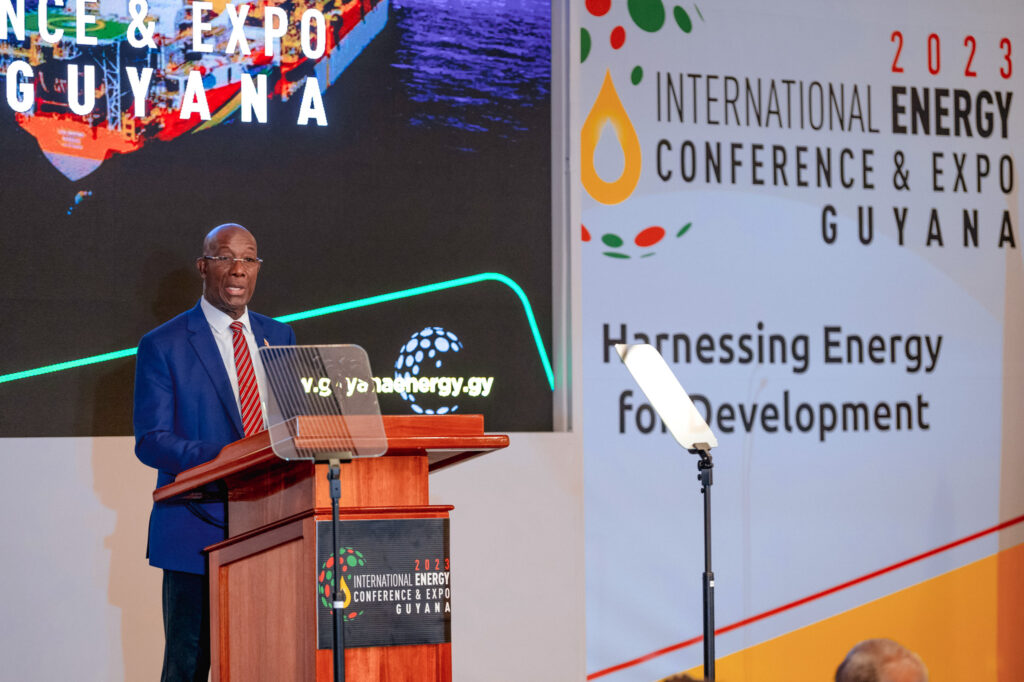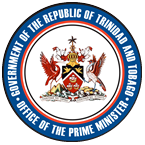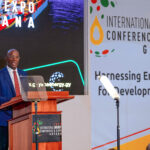- 14 FEB 2023
Prime Minister Rowley’s Address at Guyana’s International Energy Conference and Expo

`
GOVERNMENT OF THE REPUBLIC OF TRINIDAD AND TOBAGO
OFFICE OF THE PRIME MINISTER
Address
by
Dr the Honourable Keith Rowley
Prime Minister of the Republic of Trinidad and Tobago
International Energy Conference and Expo
The Co-operative Republic of Guyana
Harnessing Energy for Development
February 14, 2023
It is my pleasure to participate in today’s conference for which the theme is Harnessing Energy for Development. Various forms of energy fuel the global economy. It is a necessity for our everyday lives and has a great impact on our standards of living and economic growth. The availability of energy has not only improved our living standards but has also increased the quantity of energy we produce and consume. According to BP’s 2022 Statistical Energy Review global energy consumption over the last century has increased annually except in 2009 during the financial crisis and in 2020 with the onset of the pandemic.
Energy generated principally by fossil fuels, coal, gas and oil fueled the industrial revolutions and has resulted in transformational changes in the living standards of many nations. Industrialization, which is at the heart of structural changes has been instrumental in the economic development of the world and has led to unprecedented income growth of many populations.
There is empirical evidence that growth in global GDP bears a direct correlation to growth in energy consumption. As the GDP of a country increases, the amount of energy that is consumed is also expected to increase. The industrial sector is the engine of growth and with the right policies can transform and power the economy. The growth in living standards has not been universally uniform. The higher living standards in developed countries as compared to developing countries are as a result of higher energy consumption in the developed countries.
Energy consumption of Latin America, which includes the Caribbean, as illustrated in the BP 2022 Statistical Energy Review, amounted to 5.9 % of total global energy consumption, with the Caribbean’s contribution being only 0.4 % of total global energy consumption.
The World Bank in its October 2022 Regional Economic Update reported that as the COVID-19 crisis recedes, Latin America and the Caribbean economies had rebounded with GDP growth in 2021 of 6.8 per cent. It observed that in most countries of the region, gross domestic product and employment had fully recovered to their 2019 levels, and rising debt burdens were manageable. The growth in GDP was reflected in energy consumption which increased by 7 per cent in 2021 for the Latin America and the Caribbean Region and 14.7 per cent for the Caribbean countries as a group.
Gross domestic product (GDP) in Latin America and the Caribbean is estimated to have grown by 3.6 percent in 2022. Robust expansion in the first half of the year was driven mostly by consumption. However, activity weakened late last year as slowing global growth and tighter financial conditions started to take effect. Subdued industrial production contributed to the economic deceleration, as rising domestic and global interest rates tightened financial conditions.
Global growth is expected to decelerate sharply to 1.3 percent in 2023 but is projected to recover to about 2.4 percent in 2024. The 2023 slowdown reflects efforts by monetary authorities to curb inflation and spillovers from a weak global outlook. Regional investment is expected to decline this year, dampened by higher financing costs, soft business confidence and elevated policy uncertainty. The World Bank further advised that negative shocks, such as higher inflation, even tighter policy, deeper weakness in major economies and rising geopolitical tensions could push the global economy into recession.
In the near term, urgent global efforts are needed to mitigate the risks of global recession and debt distress in developing countries. Policies are also needed to support a major increase in investment in emerging markets and developing economies to reverse the slowdown in long-term growth exacerbated by the overlapping shocks of the pandemic, the war in Europe, and the rapid tightening of global monetary policy.
Growth in the Caribbean countries amounted to 9.7% in 2021 reflecting a resurgence in the services sector including tourism where it is estimated at 7.7% in 2022. Aside from Guyana and Trinidad and Tobago which have petroleum resource economies, the rest of the English-Speaking Caribbean rely on services such as tourism and are likely to face renewed headwinds during this period of tighter fiscal and monetary policies. The IDB in its 2022 Report on Post Pandemic Recovery in the Caribbean advised that the region should prepare for prolonged effects of external economic shocks in 2023, including high food and fuel prices and rising international interest rates.
The majority of Caribbean countries rely on imports of petroleum products which represent 87% of primary energy consumption. As a result, oil importing countries in the Caribbean have reported spending of up to 15% of annual GDP on fuel imports. The heavy dependence on imported energy has negatively affected the economic performance of many Caribbean nations, contributing to instability in both fiscal and external accounts. This includes Trinidad and Tobago which was importing most of its crude oil and creating refined products for its domestic needs and for the regional market. This import and refine model was being carried on with significant loan support from the national Treasury. By 2018, in the absence of an improved crude oil supply the accumulated debt and projections for sustained losses, resulted in a restructuring of the state-owned company and this included a closure of the refinery, which in the absence of a new source of crude, stands mothballed at Point a Pierre in Trinidad. This refinery and its supporting infrastructure are available for restart, upgrade and use on reasonable terms to any interested refiner or crude supplier.
As a net importer of energy, the Caribbean has been turning increasingly to renewable energy. The region is blessed with an abundance of high-potential renewable energy resources. It is estimated that the Caribbean holds approximately 3000 MW of potential solar energy, 800 MW of potential wind energy, and over 3000 MW of potential geothermal energy. With the appropriate investment the region can substantially reduce its dependence on imported refined energy products by harnessing the natural power generated by solar, wind, geothermal and hydroelectric sources. Even so, complete or significant substitution for hydrocarbon products is a long way off.
Climate action via an accelerated renewable energy transition has made indirect gains across the globe as countries respond to oil and gas supply restrictions and increased energy prices resulting from market disruptions. In the climate-vulnerable Caribbean, green initiatives to mitigate the impacts of climate change is another major consideration, however, the pace of change in the Caribbean has been slow. In an October 2022 release the President of the Caribbean Development Bank, reported that to meet the region’s target of 47% of renewable energy by 2027 or 55% of renewable energy by 2030, would mean installing 320 megawatts of renewable energy capacity per year, compared with the average of 25 megawatts per year installed over the last nine years across the Region.
The slow pace of change has been due to the relatively high cost of the infrastructure needed to roll out national green energy programmes, which has made switching costs prohibitive for most countries in the region. Even though green energy infrastructure and equipment are much more competitive, the fiscal challenges that characterize much of the region remain a major impediment in the pursuit of this objective. The verbal encouragement, even aggressive demands of the wealthy countries, have not been accompanied by any requisite care and investment in our small debt laden and struggling economies.
Industrialization delivers jobs and products that raise living standards, but it requires baseload power that renewables cannot immediately provide. Nevertheless, in the face of the current economic environment, building domestic / regional energy supplies enhances the regions energy security and mitigates the geopolitical risks in relying solely on energy imports. Harnessing locally available/ regional resources also reduces transmission costs and increases control over setting of policy. To address energy security and resource-shortage concerns, we need to have an energy mix that capitalizes on domestically/regionally available and economically viable sources.
In this regard, crude oil which was once seen as being at the margins of the region has become a focal point with major discoveries in Guyana, Suriname, French Guyana, Belize and Trinidad and Tobago. Beyond this, there is a huge interest by major oil and gas companies prospecting off the coasts of Barbados, Grenada, Bahamas, Cuba, Jamaica and the Dominican Republic. Exploration success by new Caribbean entrants in the petroleum industry can be a game changer for the Caribbean region.
Fossil fuels (oil and gas) will remain the dominant energy source in the near to medium term. Regional availability and infrastructure will determine how various countries expand their domestic energy supplies. Industry innovation for both fossil fuels and renewable sources will continue to increase energy supply and energy efficiency, thereby improving energy security and reducing greenhouse gas emissions.
Global trends such as climate change are forcing a rethinking of investment, especially in the light of a reshuffling of global economic activity and significant demand growth in the developing world. However, fossil fuels are still the main energy source for the world’s economic engine and are cost effective. It is resilient and affordable energy that creates economic growth. Therefore, the concept of climate change should not prevent developing countries from using fossil fuels as sources of energy in pursuit of economic growth.
It is interesting to note that during the rethink, in so far as circumstances demand, some developed countries have fired up their old coal burning plants and have declared hitherto despised nuclear power as “clean energy.” The Caribbean response is to designate natural gas as the clean energy, reserve our right and willingness to continue to explore for and market oil resources and invest in green energy and technologies as far as we are able to. We will continue to make the case to the major global polluters to encourage investment in green initiatives identified within the region. We in the Caribbean are not alone in defending our energy interests as I have consistently done. Pulitzer prize winner Daniel Yergin in his seminal 2020 text, The New Map, points out that “ in the 1990’s, before shale, gas never accounted for more than 17 percent of (electricity) generation … by 2019… gas had risen to 38 percent” and continues to rise.
The regional energy landscape does not equip any single country to meet the energy security requirements of the region. A cooperative approach allows for shared risks and diversified perspectives, and will facilitate the development and execution of innovative solutions to the challenges associated with the energy demand for the region.
It is with this recognition that Trinidad and Tobago has taken a deliberate policy to engage our regional neighbours in the development of economic co-operation in the energy sector. To this end we have executed unitization agreements with the Government of the Bolivarian Republic of Venezuela, the Government of Barbados and the Government of Grenada, which will allow for the exploration of hydrocarbon resources in the maritime boundaries shared with our neighbours. We have executed a Memorandum of Understanding with the Government of the Co-operative Republic of Guyana and also with the Government of the Republic of Haiti on co-operation in the Field of Energy.
We also executed a Heads of Agreement with the Bolivarian Government of Venezuela for the development of the Dragon Field located in the eastern end of the Mariscal Sucre area of Venezuela to facilitate the sale of natural gas for supply, by pipeline, to the domestic market and the LNG facility located in Trinidad and Tobago. The progress in the development of the Dragon field was disrupted and delayed by US sanctions against Venezuela. Following the request by the Government of Trinidad and Tobago, the US Treasury Department recently granted the Government an initial two-year (OFAC) licence to develop the Dragon field with a view to enhancing Caribbean Energy security.
In today’s economic environment, however, investments in enabling infrastructure and technology can be costly even to the point of being prohibitive. Trinidad and Tobago has the energy infrastructure to monetize hydrocarbon resources produced by its Caribbean neighbours. The country possesses ten ammonia plants, seven methanol plants, four LNG plants, an iron and steel complex which at peak performance utilized as feedstock four bcf of natural gas per day and an oil refinery which processed up to 140,000 barrels of oil per day. Our current natural gas production averages 2.8 bcf per day and we are still exploring the market for a user for the oil refinery.
Trinidad and Tobago therefore provides a viable option for those countries that wish to optimize the monetization of their hydrocarbon resources without incurring substantial capital expenditure. The proposed Dragon Gas Project with Bolivarian Government of Venezuela is an example of Government to Government co-operation in the monetizing of natural gas resources. We are open to discussion with our other Caribbean neighbours on the monetization of their hydrocarbon resources in Trinidad and Tobago. We would also wish to assist you in developing programmes to meet the necessary training needs of your energy personnel. Trinidad and Tobago possesses a number on non-governmental and government agencies that have been meeting the human resource development needs of the energy and industrial sectors of Trinidad and Tobago as well as emerging oil and gas economies.
As an emerging major oil and gas producing region, we have a window of opportunity to take a proactive approach to leveraging our collective knowledge and expertise to optimize new opportunities going forward. Linking the energy and industrial transformations to a collaborative economic strategy would ensure that the region makes the most out of its abundant oil and gas resources. We must use our energy resources for the benefit of our people, to build resilience and scale in our economies and to create energy security for the region.
I am confident that the spirit of community, which has been key to our success as the oldest surviving integration movement in the developing world, will foster and augment the level of co-operation that can make the Caribbean an economic force in the region.
In closing, I wish to thank the Government of the Cooperative Republic of Guyana for the invitation and the opportunity to deliver remarks to this distinguished audience and to wish all participants a successful Conference.





